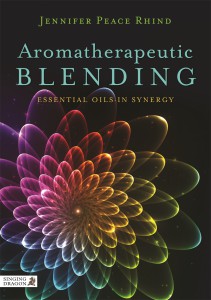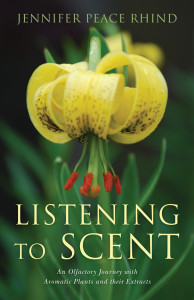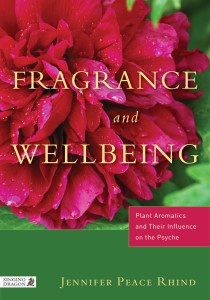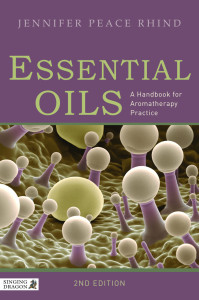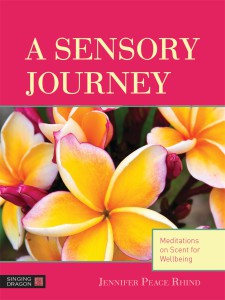An interview with our author, Jennifer Peace Rhind, by Linda Gray. This interview is also featured in the Christmas edition of Good Housekeeping.

Are there any scents apart from grapefruit that make us seem younger?
Grapefruit is perceived as an ‘activating’ scent, and is associated with energy and freshness and indeed youth! But does this mean that wearing a grapefruit fragrance will make us appear younger?
Maybe – we might feel energised, and this can affect how we behave and project our self, and this may give the superficial impression of youth.
But, our reactions to scent are often personal, and influenced by many things – including our biology, learned behaviours and cultural associations. The effects of scent on our physiology, on how we behave, how we perceive others, how they perceive us, and on our social interactions is a massive topic – and studies in recent years are beginning to give us some answers – and raise even more questions. It would appear that others will respond and react to us more positively if we are wearing a self-selected scent rather than one that someone else has chosen for us. Wearing grapefruit cologne because we have read that it will make us seem younger to others, or a spicy-floral scent because it can make us appear slimmer, or a lavender or spicy apple fragrance because some males can find these scents arousing, is not actually the best plan! The key is to select your fragrances to please yourself! Applying scents that you particularly enjoy and take pleasure in may enhance and amplify your biological odour signature, and it can also improve mood, self-confidence and, yes, your social interactions. Don’t be afraid to learn and experiment with scents – it is a lot of fun – become aware of how they make you feel, and then you can select according to your mood, social plans, or even the seasons. And if you like grapefruit you may also like other sharp citrus oils such as lime and lemon. Grapefruit fragrances can be a bit one dimensional but, some a good ones to try are Guerlain’s Aqua Allegoria Pamplelune and Hermès Eau de Pamplemousse Rose.
Are any scents known to have a rejuvenating effect on the brain or body?
Yes. Research has shown that some essential oil scents such as the fresh, herbal rosemary, can have a positive impact on memory and recall – and this aligns with one of its uses in early herbal medicine and in folk tradition. Others such as the beautiful clean, forest scent of Siberian fir can improve vigilance and reduce anxiety when working at a VDU for prolonged periods.
One of the big problems facing us today is the increasing incidence of Alzheimer’s Disease and dementia. We know that essential oil molecules can access the brain directly, passing through the blood brain barrier, and it is believed that some essential oil vapours – including narcissus, plai (a relative of ginger used in Thai traditional medicine), lemon (the peel is used in traditional Chinese and African medicine to treat cognitive decline), frankincense (used in early herbal medicine to improve the functioning of the mind), and some of the constituents of thyme – have the potential to manage impaired cognitive function, memory and behaviour.
However, there is another important aspect to scent and ageing. It is believed that by actively cultivating our sense of smell, and creating an olfactory memory, we can enhance our cognitive processes (perception, awareness, discernment, learning, insight, reasoning and thinking), and this can promote wellbeing. It may also mean that as we age, and lose our olfactory acuity (which invariably has a negative impact on wellbeing), our olfactory memory will help offset this loss. If we continue to consciously and actively use our sense of smell as we grow older, we might also keep its neural circuits active, and lessen the impact of time. The loss of the sense of smell is devastating at any stage of our lives, and no less so as time diminishes it.
You ask about rejuvenating the body too. Many aromatic plants have the ability to protect and regenerate skin cells. For example, rose absolute can improve the appearance and texture of the skin and is often included in anti-aging cosmeceuticals. Interestingly, there are olfactory receptors in the skin, and so the interaction of scented molecules with these receptors might be part of this highly complex process.
So, can the scents of essential oils rejuvenate the body? I would say, yes – but indirectly and not in the way you might imagine…. Research in ‘metabonomics’ – the study of the metabolic responses to exposure to the inhalation of essential oils – has suggested that their vapours have subtle yet far-reaching effects, such as modulating the production of some neurotransmitters. We are also aware that the inhalation of certain aromatic vapours can alter gut flora, and some may even prevent atherosclerotic plaques forming. Many essential oils are also excellent anti-oxidants, and may have a role in the prevention of some degenerative changes associated with ageing. There is a lot we have yet to learn!
Can we use scent to re-awaken happy memories? I’ve read a little about how scent can trigger memories but wondered if this can be done consciously, e.g. could wearing a scent you used when you first met your partner improve your relationship?!
Thanks to the writings of Proust, the notion of scent awakening memories has become embedded in our collective psyche! This type of memory is even called a Proustian memory, and most of us will have experienced this. It is perhaps this emotionally charged intense ‘feeling’ quality that typifies memories triggered by smells, along with the sense that the memory is accurate, and of being brought back to the original event, that defines the Proust phenomenon. Another distinguishing feature is that the particular odour cue may be experienced just once when it is linked to the event – if an odour is smelled on a frequent basis, it is much less likely to trigger a Proustian memory. These memories are usually characterised by nostalgia, which facilitates the continuity of our identity, because nostalgia gives us a benchmark – an earlier version of our self in comparison to our current self. A personal example – every time I spray myself with Diorella – I am, just for a moment, back in 1973, a young woman, preparing for a date with my boyfriend and wearing this scent for the first time. I can recall my black satin shirt, and pink pencil skirt, and the silver filigree pendant of a Viking ship that my father bought for me in Orkney. I am looking in the mirror of my grandmother’s old dressing table (I can smell that too!), and I am feeling very happy with the way I look, and I am full of hope for the future. When I wear Diorella now, I get an instant, fleeting sense of my younger self. It is very powerful.
So, it is possible, that if we were to wear a scent from our past that is associated with a specific and emotionally charged event, we might be able to tap into good memories. If however, your scent was something that you routinely applied, there would be less chance of this happening. Having said that, romantic attraction is inextricably linked with our biological olfactory ‘signature’ – whether this is natural or enhanced by the use of fragrance, and we can harness the power of scent to gently encourage a loving and perhaps sensually-charged relationship. Just think of Cleopatra’s use of fragrance to entice Mark Antony… but in contemporary times, we probably do not have the option of scenting the sails of our ship or strewing our bedchamber with roses. We can, however, scent our rooms and persons with some of the legendary aphrodisiacal fragrances and incenses, such as rose and jasmine flowers and oils, tiny quantities of ylang ylang essential oil, sandalwood oil, and of course the spices – saffron, cardamom and nutmeg. Contemporary research has shown that such scents can bring about both physical relaxation and behavioural activation simultaneously – in other words, a sense of wellbeing, physically relaxed but attentive and in touch with your senses – perfect for re-kindling and nurturing a loving relationship. Or, maybe you can identify a scent that you both enjoyed but have not used for a while, one that can conjure up feelings of shared ‘good times’ – patchouli oil or Nag Champa incense might do it for some of us!
Jennifer Peace Rhind – short bio
Jennifer Peace Rhind is a author, writer and consultant in essential oil and scent education. She has a PhD in Biological Science from the University of Strathclyde and she was a lecturer in Higher Education for fourteen years. Her books include Essential Oils – A Handbook for Aromatherapy practice, Fragrance and Wellbeing – Plant Aromatics and Their Influence on the Psyche, Listening to Scent – An Olfactory Journey with Aromatic Plants and their Extracts and Aromatherapeutic Blending – Essential Oils in Synergy (October 2015). All of these are published by Singing Dragon, and explore the relationship between health and wellbeing and the senses, especially the sense of smell. She lives in the south of Scotland with her husband and a Tibetan Terrier called Leeloo.
Books by Jennifer Peace Rhind
